【BBC六分钟英语】你会赠送你的财富吗?

【英文脚本】
Neil
Hello and welcome to 6 Minute English. I’m Neil…
Sophie
And I’m Sophie…
Neil
Sophie, I can’t get out of my head what Mark Zuckerberg, you know, the guy who created Facebook, said recently.
Sophie
Oh, I know, he pledged, or made a serious promise, to give away 99% of his shares in Facebook over the course of his lifetime. The shares are currently worth around $45bn.
Neil
Why, oh why did he decide to give his fortune away? It’s puzzling to me.
Sophie
It’s an act of philanthropy, which means helping others, especially by giving large amounts of money to good causes.
Neil
And philanthropy is the subject of this show.
Sophie
But don’t worry about Zuckerberg, it’s probably fair to say that he will remain extremely well off, or wealthy, even after giving away his fortune.
Neil
Well, that’s true. Let me ask you then today’s quiz question: Who was the most generous philanthropist in the US last year? Was it… a) Bill Gates? b) Mark Zuckerberg? Or c) Warren Buffett?
Sophie
I’m going to say… c) Warren Buffett.
Neil
Well, we’ll find out if you were right or not later on in the show. Now, Zuckerberg was inspired to give away his fortune by the birth of his daughter Max. In a letter to Max – posted on Facebook. In his post, he talks about using the money to advance human potential and promote equality for all children in the next generation. Equality, in other words, with the same rights and opportunities.
Sophie
Zuckerberg is the latest in a long line of billionaire entrepreneurs to turn philanthropist and use his money for good causes. Did you know that some of the earliest American philanthropists were robber barons?
Neil
Robber barons? What’s … ? Hang on, what’re robber barons?
Sophie
They’re business people who use unethical - or morally wrong - business tactics to gain large personal fortunes. Nineteenth-century entrepreneurs like Rockefeller, Carnegie and Ford were robber barons. They built up huge empires in industry, oil, steel, railways, and cars, and were largely responsible for transforming the United States from an agricultural nation into an industrial one.
Neil
Henry Ford, he’s the one who said you can have any colour you want as long as it’s black. I like that kind of thing.
Sophie
Focus, Neil!
Neil
OK. OK.
Sophie
But as the barons got older, they decided they wanted to give back to society, and turned to philanthropy. Andrew Carnegie believed that wealth should be spent to make the world a better place.
Neil
That sounds too warm and fuzzy for a ruthless, or cruel - robber baron.
Sophie
People change, Neil! When he died, Carnegie had given away a total of $350m to the state to spend on public works. That’s around $8bn in today’s money.
Neil
Well, let’s listen to Hugh Cunningham, a Professor of History at the University of Kent here, in the UK. He talks about what the average Joe, that’s you and me, folks, thinks about big business and philanthropy today.
Hugh Cunningham, Emeritus Professor of History at the University of Kent
The very word philanthropy does not necessarily have 100% positive connotations for the public at large given where we are in terms of the public’s attitude towards business or the banks and that kind of stuff. So I think it’s in everyone’s interests to try and broaden out the concept of philanthropy into a wider notion of giving, making a contribution, making a difference.
Neil
Yes, banks and big businesses can easily afford to give away millions of dollars for the public good if they choose to. It is not so easy when you’re an individual struggling to pay the rent.
Sophie
That’s right, Neil. But a lot of people in the UK are super-rich compared to those in the developing world. And we can make a big difference by donating, or giving, smaller amounts of money to help improve their lives.
Neil
And that’s what Professor Cunningham means when he says we should broaden out the notion, or idea, of philanthropy. It’s not only robber barons who can afford to be philanthropic. Let’s listen to Toby Ord, a graduate student from Oxford University talking about how he makes a difference.
Toby Ord, moral philosopher, Oxford University
I worked out that over my life I’d be able to earn about £1.5m and that I could maintain my current standard of living as a graduate student and still donate about £1m of that.
Sophie
So Toby actually gives away any money that he earns above £18,000 a year. He feels that he doesn’t need more than this amount to maintain his standard of living.
Neil
I’m impressed by Toby’s pledge but I don’t think I could live like a student my whole life!
Sophie
I thought that would suit you extremely well, Neil! Now why don’t you give us the answer to today’s quiz question?
Neil
I asked: Who was the most generous philanthropist in the US last year? Was it… a) Bill Gates? b) Mark Zuckerberg? Or c) Warren Buffett?
Sophie
I said Warren Buffett.
Neil
Good guess, Sophie! Well done! Buffett, who made his $73bn fortune from investments, donated $2.8bn to charity in 2014 bringing his lifetime total to almost $23bn, according to Forbes. That’s a tidy sum, and that means a large number! OK let’s hear those words again, Sophie.
Sophie
Here they are: pledged philanthropy well off human potential equality unethical ruthless average Joe donating a tidy sum
Neil
Well, that’s the end of today’s 6 Minute English. Please join us again soon!
Both
Bye.
【中英文双语脚本】
Neil(尼尔)
Hello and welcome to 6 Minute English. I’m Neil…
您好,欢迎来到 6 Minute English。我是 Neil…
Sophie(苏菲)
And I’m Sophie…
我是 Sophie……
Neil(尼尔)
Sophie, I can’t get out of my head what Mark Zuckerberg, you know, the guy who created Facebook, said recently.
Sophie,我无法摆脱 Mark Zuckerberg 最近说的话,你知道的,Facebook 的创建者。
Sophie(苏菲)
Oh, I know, he pledged, or made a serious promise, to give away 99% of his shares in Facebook over the course of his lifetime. The shares are currently worth around $45bn.
哦,我知道,他承诺,或者说做出了一个严肃的承诺,在他的一生中,将捐出他在 Facebook 的 99% 的股份。这些股票目前价值约 450 亿美元。
Neil(尼尔)
Why, oh why did he decide to give his fortune away? It’s puzzling to me.
为什么,哦,为什么他决定把他的财产捐出去?这让我感到困惑。
Sophie(苏菲)
It’s an act of philanthropy, which means helping others, especially by giving large amounts of money to good causes.
这是一种慈善行为,这意味着帮助他人,尤其是通过向公益事业捐赠大量资金。
Neil(尼尔)
And philanthropy is the subject of this show.
而慈善事业是这个展览的主题。
Sophie(苏菲)
But don’t worry about Zuckerberg, it’s probably fair to say that he will remain extremely well off, or wealthy, even after giving away his fortune.
但不要担心扎克伯格,可以公平地说,即使在捐出他的财富之后,他也会保持非常富裕或富有。
Neil(尼尔)
Well, that’s true. Let me ask you then today’s quiz question: Who was the most generous philanthropist in the US last year? Was it… a) Bill Gates? b) Mark Zuckerberg? Or c) Warren Buffett?
嗯,这是真的。那么,让我问你今天的问答问题:谁是去年美国最慷慨的慈善家?是不是……a) 比尔·盖茨?b) 马克·扎克伯格(Mark Zuckerberg)?或者 c) 沃伦·巴菲特?
Sophie(苏菲)
I’m going to say… c) Warren Buffett.
我要说……c) 沃伦·巴菲特。
Neil(尼尔)
Well, we’ll find out if you were right or not later on in the show. Now, Zuckerberg was inspired to give away his fortune by the birth of his daughter Max. In a letter to Max – posted on Facebook. In his post, he talks about using the money to advance human potential and promote equality for all children in the next generation. Equality, in other words, with the same rights and opportunities.
好吧,我们稍后会在节目中找出你是对还是错。现在,扎克伯格受到女儿 Max 出生的启发,将他的财富捐给了别人。在给 Max 的一封信中 – 发布在 Facebook 上。在他的帖子中,他谈到了利用这笔钱来提升人类的潜力并促进下一代所有儿童的平等。换句话说,平等,拥有相同的权利和机会。
Sophie(苏菲)
Zuckerberg is the latest in a long line of billionaire entrepreneurs to turn philanthropist and use his money for good causes. Did you know that some of the earliest American philanthropists were robber barons?
扎克伯格是众多亿万富翁企业家中最新一位转为慈善家并将他的钱用于公益事业。您知道一些最早的美国慈善家是强盗大亨吗?
Neil(尼尔)
Robber barons? What’s … ? Hang on, what’re robber barons?
强盗大亨?什么是 … ?等等,什么是强盗大亨?
Sophie(苏菲)
They’re business people who use unethical - or morally wrong - business tactics to gain large personal fortunes. Nineteenth-century entrepreneurs like Rockefeller, Carnegie and Ford were robber barons. They built up huge empires in industry, oil, steel, railways, and cars, and were largely responsible for transforming the United States from an agricultural nation into an industrial one.
他们是商人,使用不道德或道德上错误的商业策略来获得巨额个人财富。洛克菲勒、卡内基和福特等 19 世纪的企业家都是强盗大亨。他们在工业、石油、钢铁、铁路和汽车方面建立了巨大的帝国,并在很大程度上负责将美国从一个农业国家转变为一个工业国家。
Neil(尼尔)
Henry Ford, he’s the one who said you can have any colour you want as long as it’s black. I like that kind of thing.
Henry Ford,他说你可以拥有任何你想要的颜色,只要它是黑色的。我喜欢这种事情。
Sophie(苏菲)
Focus, Neil!
专注,尼尔!
Neil(尼尔)
OK. OK.
好的。
Sophie(苏菲)
But as the barons got older, they decided they wanted to give back to society, and turned to philanthropy. Andrew Carnegie believed that wealth should be spent to make the world a better place.
但随着大亨们年龄的增长,他们决定要回馈社会,并转向慈善事业。安德鲁·卡内基 (Andrew Carnegie) 认为,应该花费财富来让世界变得更美好。
Neil(尼尔)
That sounds too warm and fuzzy for a ruthless, or cruel - robber baron.
对于一个无情或残忍的强盗大亨来说,这听起来太温暖和模糊了。
Sophie(苏菲)
People change, Neil! When he died, Carnegie had given away a total of $350m to the state to spend on public works. That’s around $8bn in today’s money.
人会变,尼尔!当他去世时,卡内基总共向国家捐赠了 $350m,用于公共工程。这大约是今天的 80 亿美元。
Neil(尼尔)
Well, let’s listen to Hugh Cunningham, a Professor of History at the University of Kent here, in the UK. He talks about what the average Joe, that’s you and me, folks, thinks about big business and philanthropy today.
好吧,让我们听听英国肯特大学的历史教授 Hugh Cunningham 的演讲。他谈到了普通人,也就是你和我,伙计们,对当今大企业和慈善事业的看法。
Hugh Cunningham, Emeritus Professor of History at the University of Kent(休·坎宁安(HughCunningham),肯特大学(UniversityofKent)历史学名誉教授)
The very word philanthropy does not necessarily have 100% positive connotations for the public at large given where we are in terms of the public’s attitude towards business or the banks and that kind of stuff. So I think it’s in everyone’s interests to try and broaden out the concept of philanthropy into a wider notion of giving, making a contribution, making a difference.
鉴于我们所处的位置,慈善事业这个词对广大公众来说不一定具有 100% 的积极含义。因此,我认为尝试将慈善事业的概念扩大为更广泛的捐赠、贡献、有所作为的概念,这符合每个人的利益。
Neil(尼尔)
Yes, banks and big businesses can easily afford to give away millions of dollars for the public good if they choose to. It is not so easy when you’re an individual struggling to pay the rent.
是的,如果银行和大企业愿意,他们很容易负担得起为公共利益捐赠数百万美元。当您是一个努力支付房租的个人时,这并不容易。
Sophie(苏菲)
That’s right, Neil. But a lot of people in the UK are super-rich compared to those in the developing world. And we can make a big difference by donating, or giving, smaller amounts of money to help improve their lives.
没错,尼尔。但与发展中国家的人相比,英国的很多人都是超级富豪。我们可以通过捐赠或给予少量资金来帮助改善他们的生活,从而产生很大的影响。
Neil(尼尔)
And that’s what Professor Cunningham means when he says we should broaden out the notion, or idea, of philanthropy. It’s not only robber barons who can afford to be philanthropic. Let’s listen to Toby Ord, a graduate student from Oxford University talking about how he makes a difference.
这就是 Cunningham 教授说我们应该扩大慈善事业的概念或理念的意思。不仅仅是强盗大亨有能力做慈善。让我们听听牛津大学研究生 Toby Ord 谈论他如何有所作为。
Toby Ord, moral philosopher, Oxford University(TobyOrd,牛津大学道德哲学家)
I worked out that over my life I’d be able to earn about £1.5m and that I could maintain my current standard of living as a graduate student and still donate about £1m of that.
我发现,在我的一生中,我将能够赚取大约 £1.5m,并且我可以维持目前作为研究生的生活水平,并且仍然可以捐赠其中的大约 £1m。
Sophie(苏菲)
So Toby actually gives away any money that he earns above £18,000 a year. He feels that he doesn’t need more than this amount to maintain his standard of living.
所以 Toby 实际上把他每年赚到 18,000 英镑以上的任何钱都捐出去了。他觉得他不需要超过这个数额来维持他的生活水平。
Neil(尼尔)
I’m impressed by Toby’s pledge but I don’t think I could live like a student my whole life!
Toby 的承诺给我留下了深刻的印象,但我认为我不能一辈子都像学生一样生活!
Sophie(苏菲)
I thought that would suit you extremely well, Neil! Now why don’t you give us the answer to today’s quiz question?
我觉得这很适合你,尼尔!现在,您为什么不给我们今天的测验问题的答案呢?
Neil(尼尔)
I asked: Who was the most generous philanthropist in the US last year? Was it… a) Bill Gates? b) Mark Zuckerberg? Or c) Warren Buffett?
我问:谁是去年美国最慷慨的慈善家?是不是……a) 比尔·盖茨?b) 马克·扎克伯格(Mark Zuckerberg)?或者 c) 沃伦·巴菲特?
Sophie(苏菲)
I said Warren Buffett.
我说的是沃伦·巴菲特(Warren Buffett)。
Neil(尼尔)
Good guess, Sophie! Well done! Buffett, who made his $73bn fortune from investments, donated $2.8bn to charity in 2014 bringing his lifetime total to almost $23bn, according to Forbes. That’s a tidy sum, and that means a large number! OK let’s hear those words again, Sophie.
猜得好,苏菲!干的好!据《福布斯》报道,巴菲特通过投资赚取了 730 亿美元的财富,他在 2014 年向慈善机构捐赠了 28 亿美元,使他一生的总财富达到近 230 亿美元。这是一个相当大的总和,这意味着一个很大的数字!好,让我们再听一遍这些话,Sophie。
Sophie(苏菲)
Here they are: pledged philanthropy well off human potential equality unethical ruthless average Joe donating a tidy sum
他们是这样的: 承诺的慈善事业 富裕的 人类潜力 平等 不道德的 无情的普通 乔 捐赠了一笔可观的款项
Neil(尼尔)
Well, that’s the end of today’s 6 Minute English. Please join us again soon!
好了,今天的六分钟 English 到此结束。请尽快再次加入我们!
Both(双)
Bye.
再见。

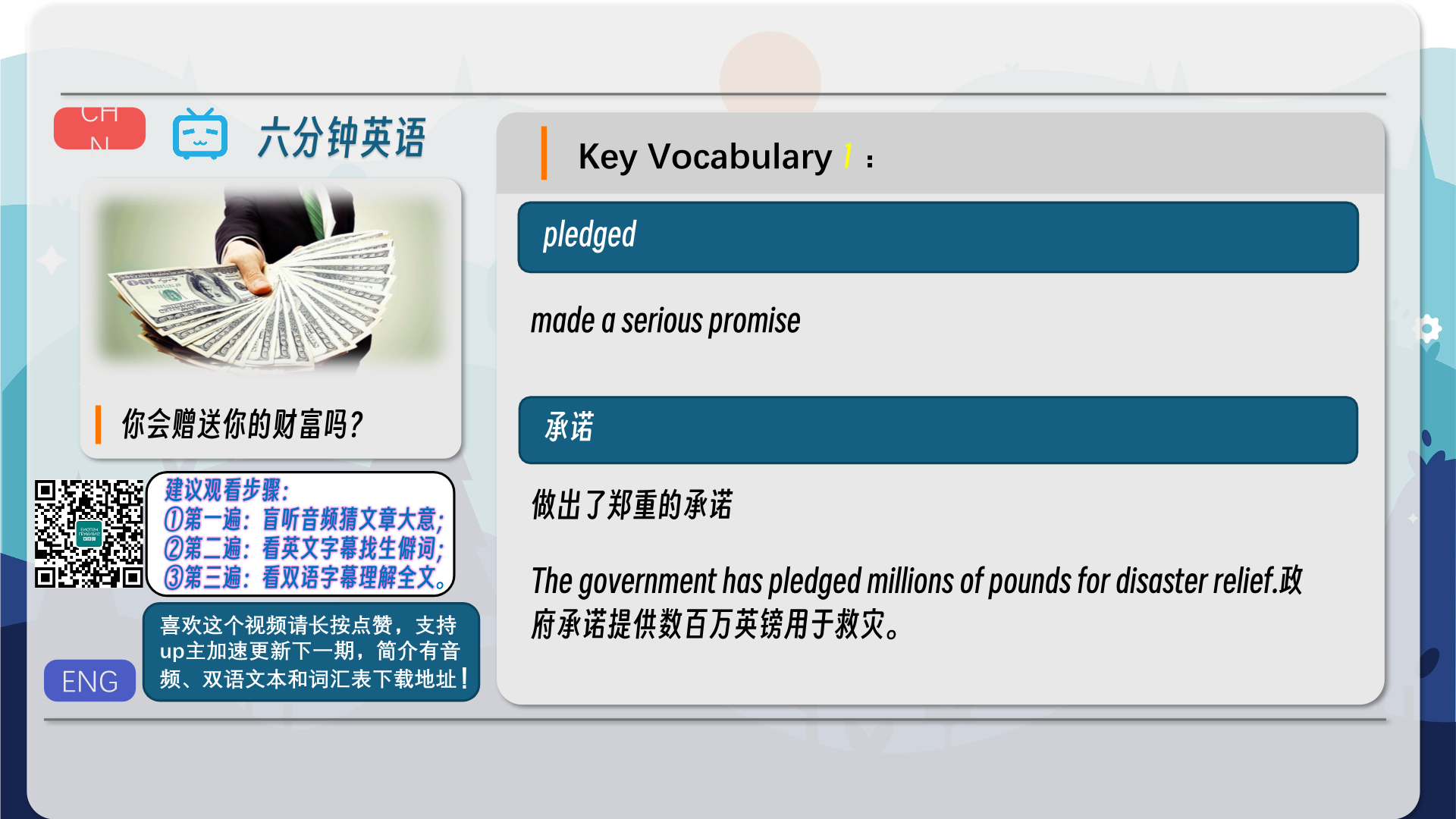
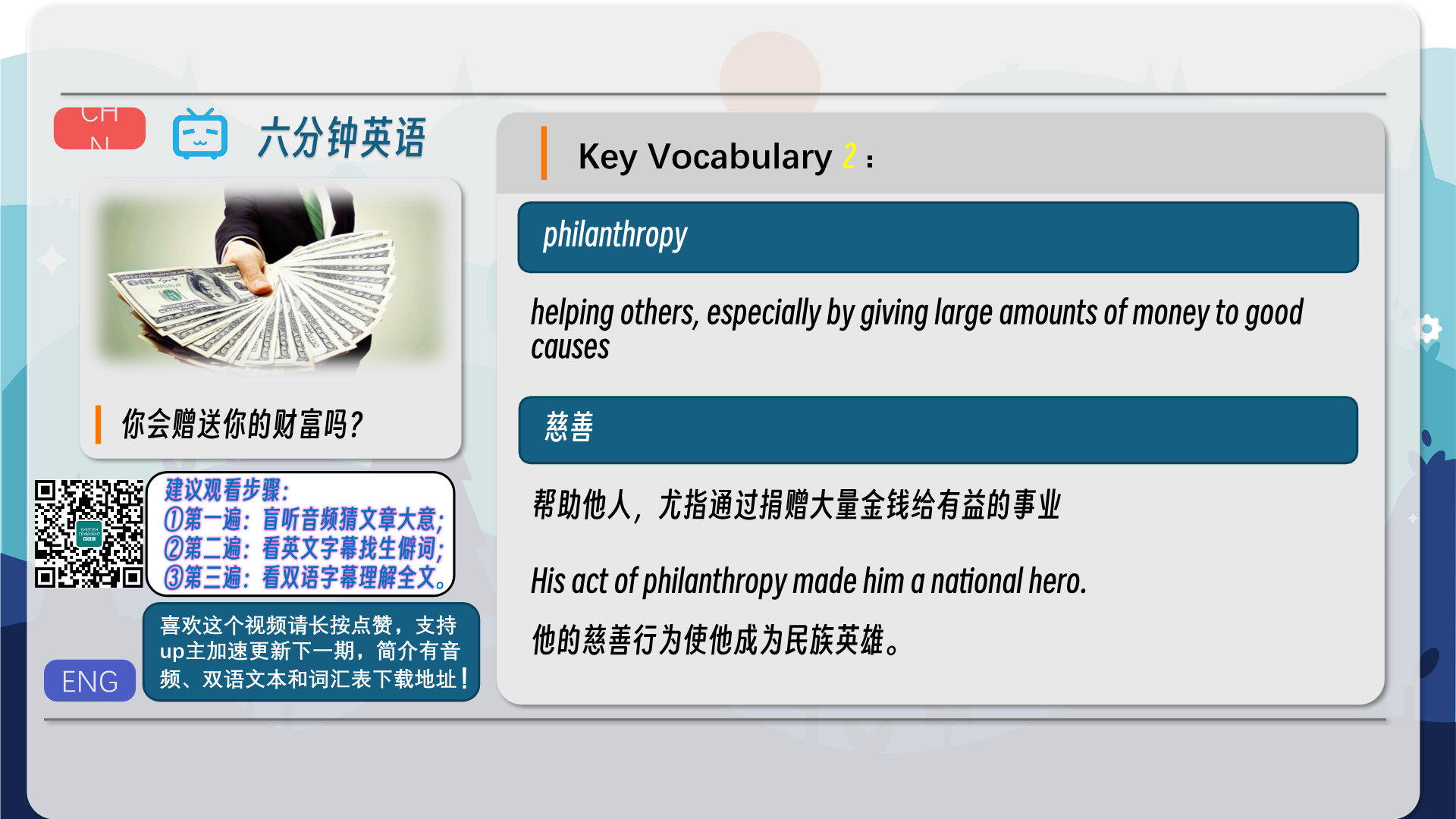
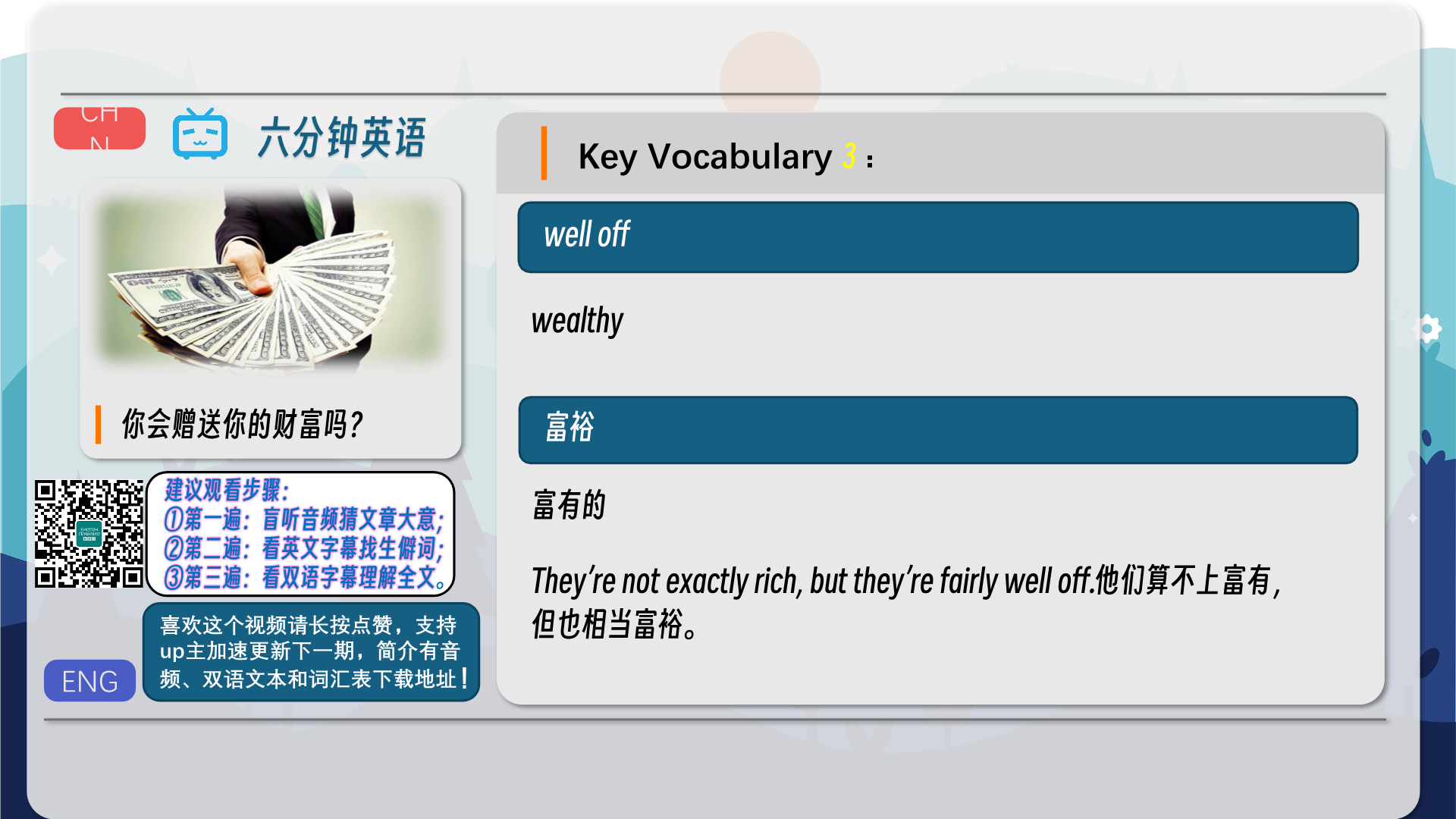
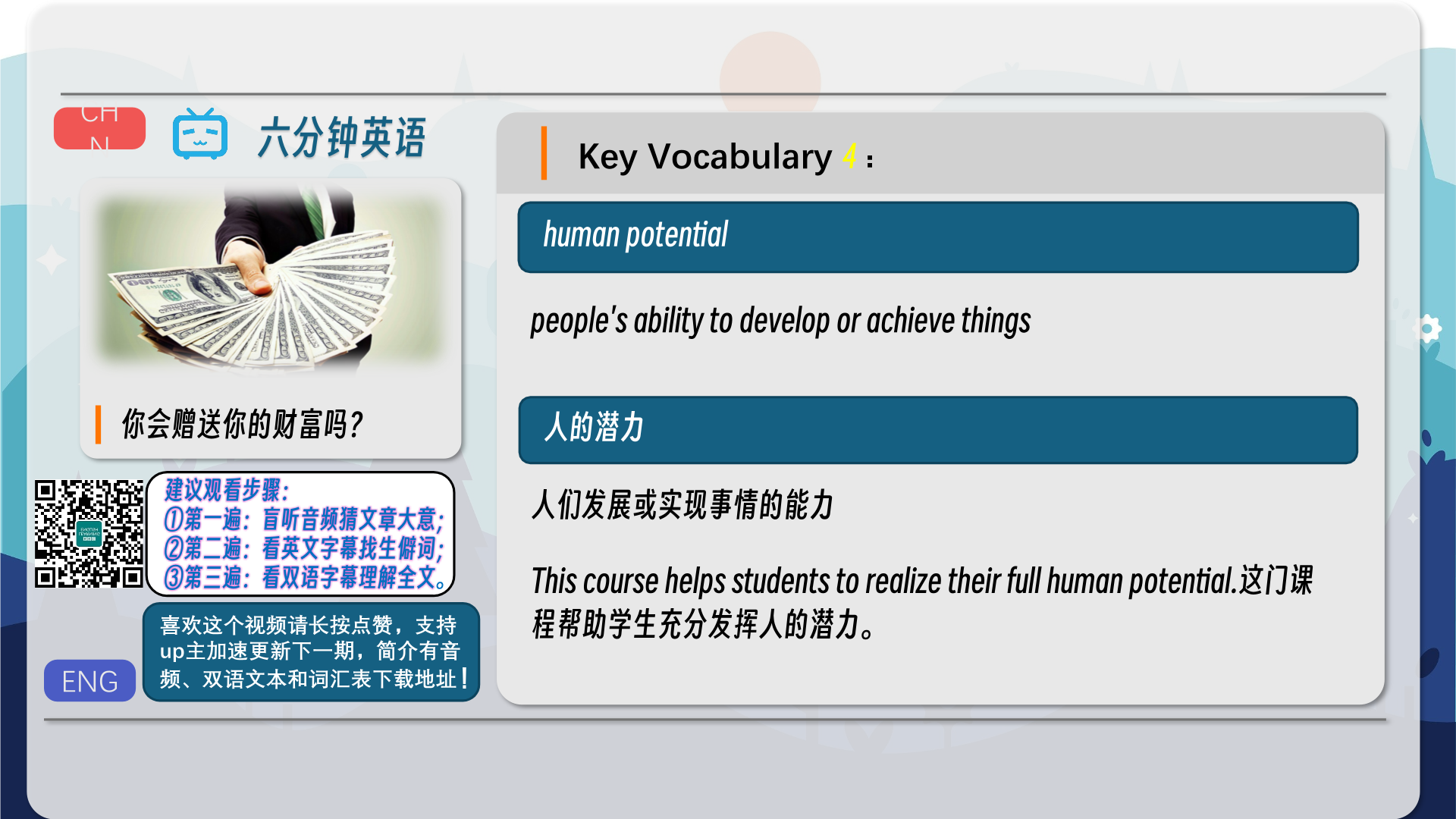
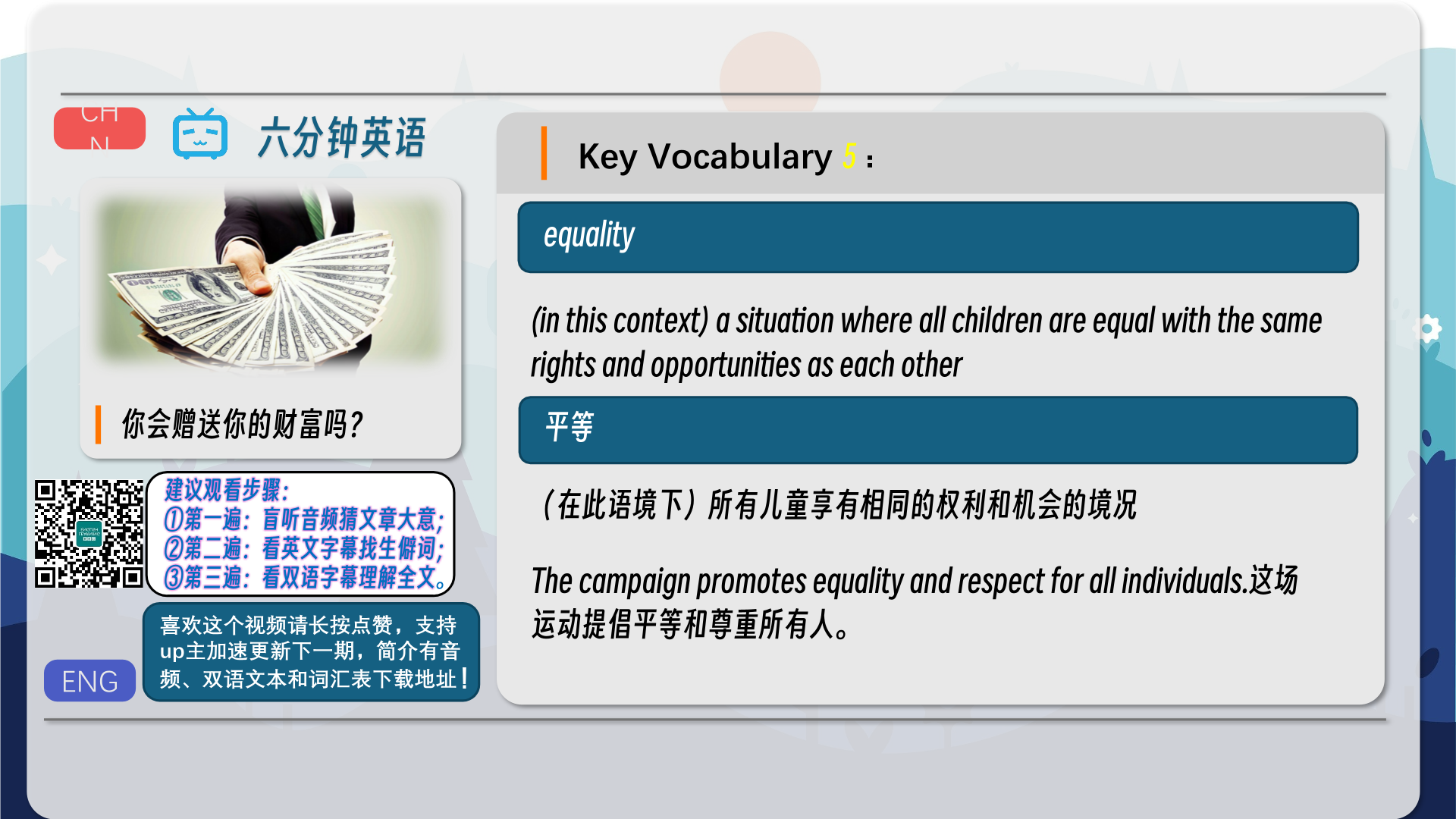
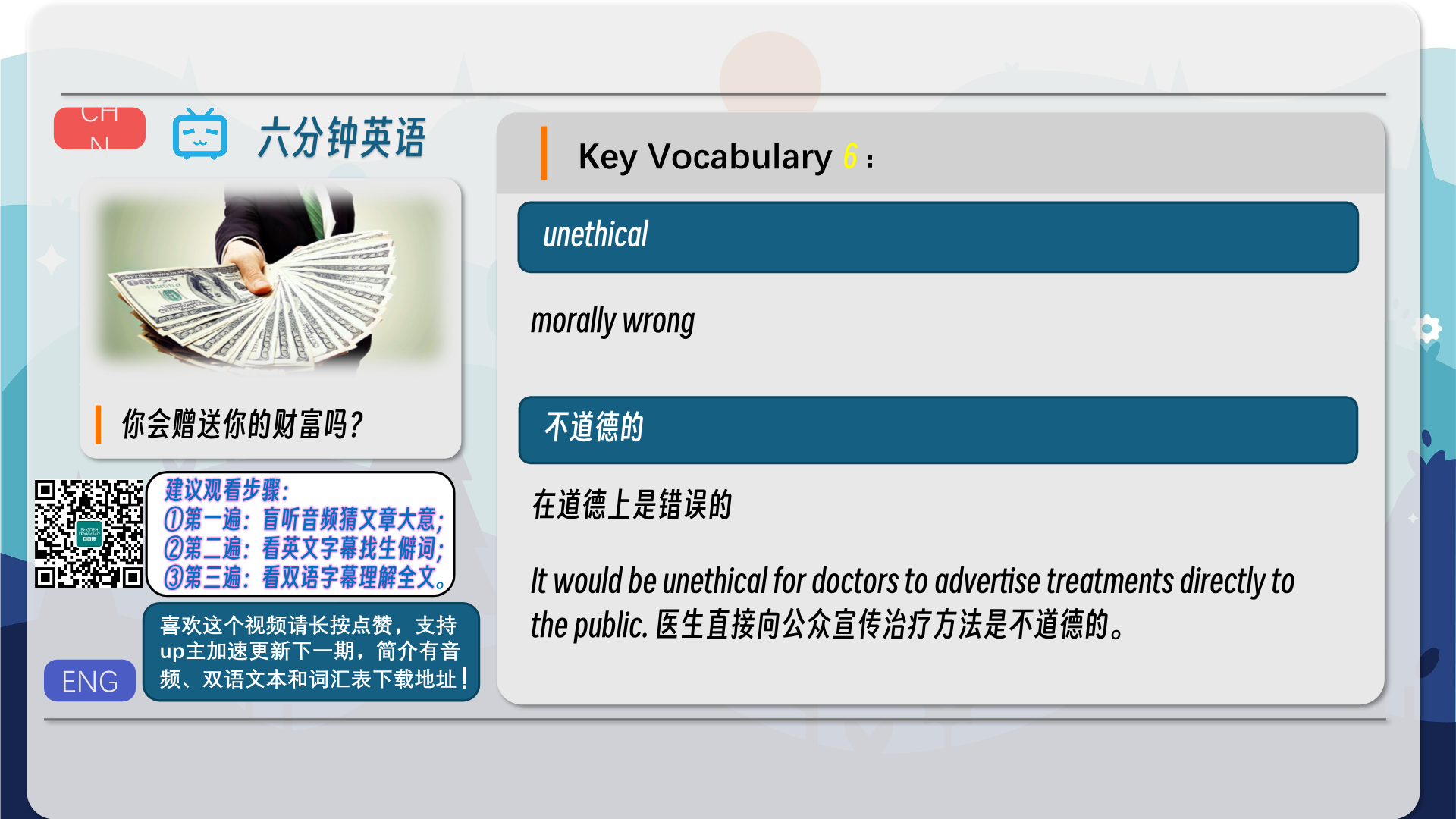
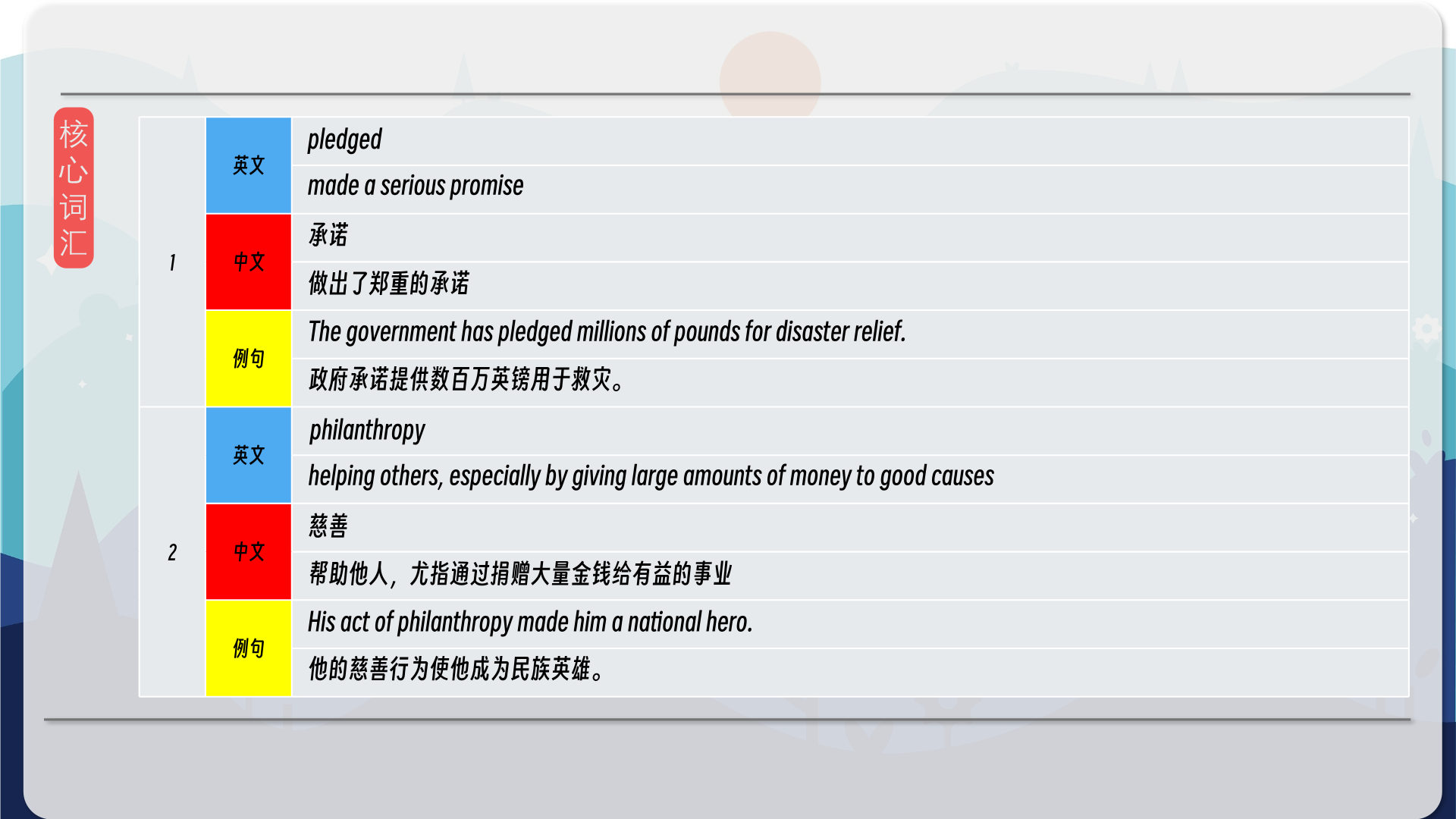
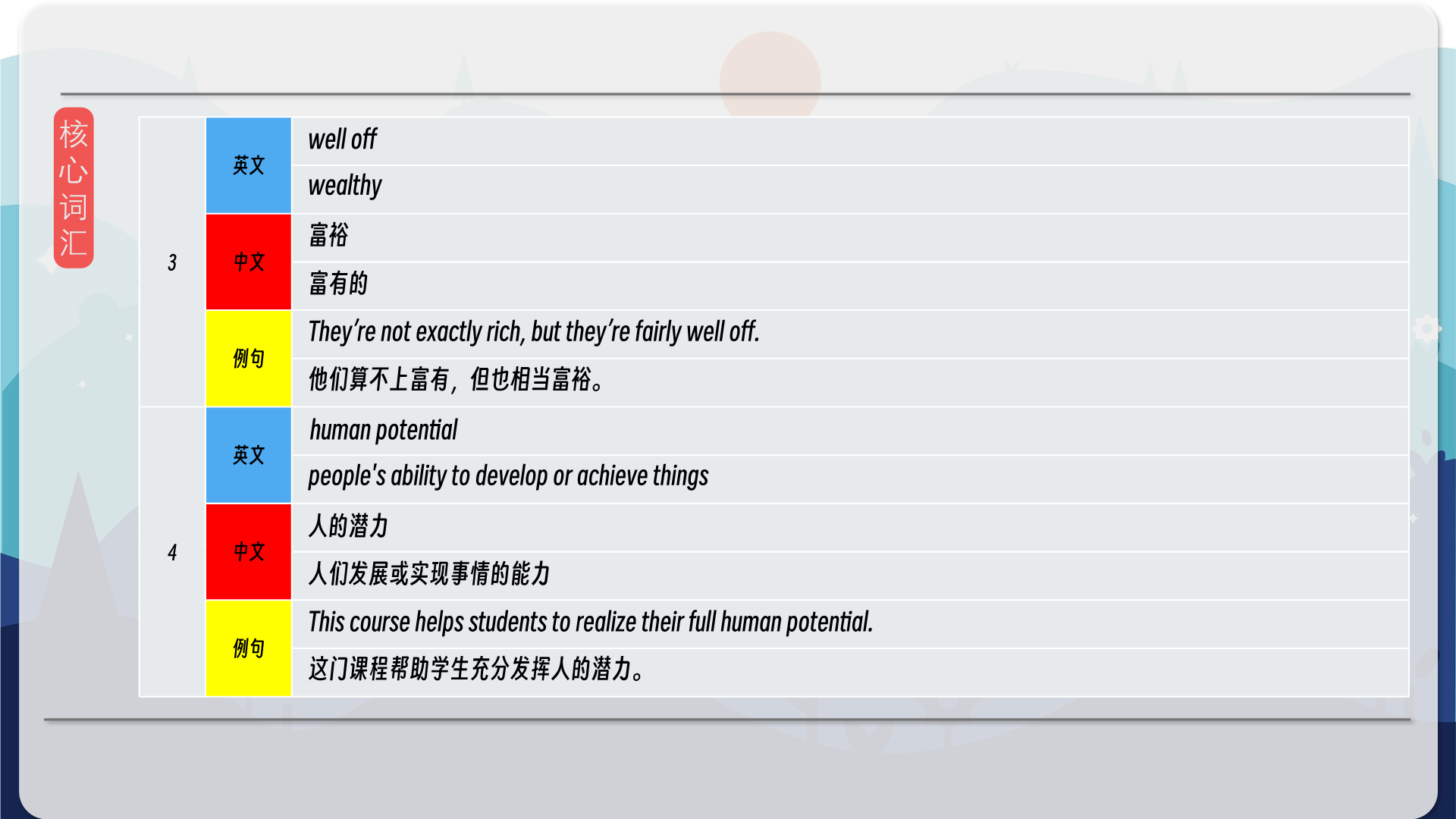

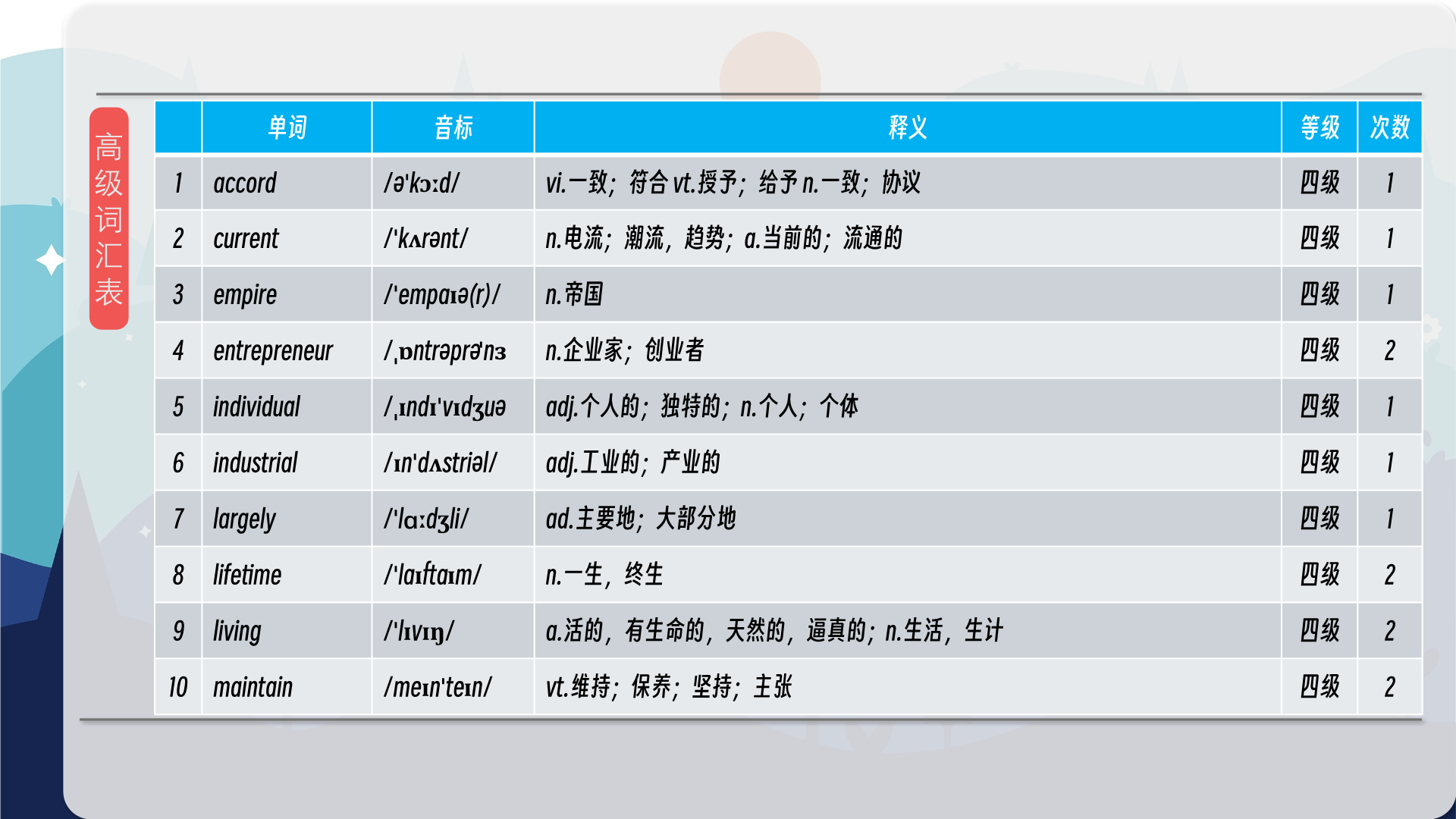
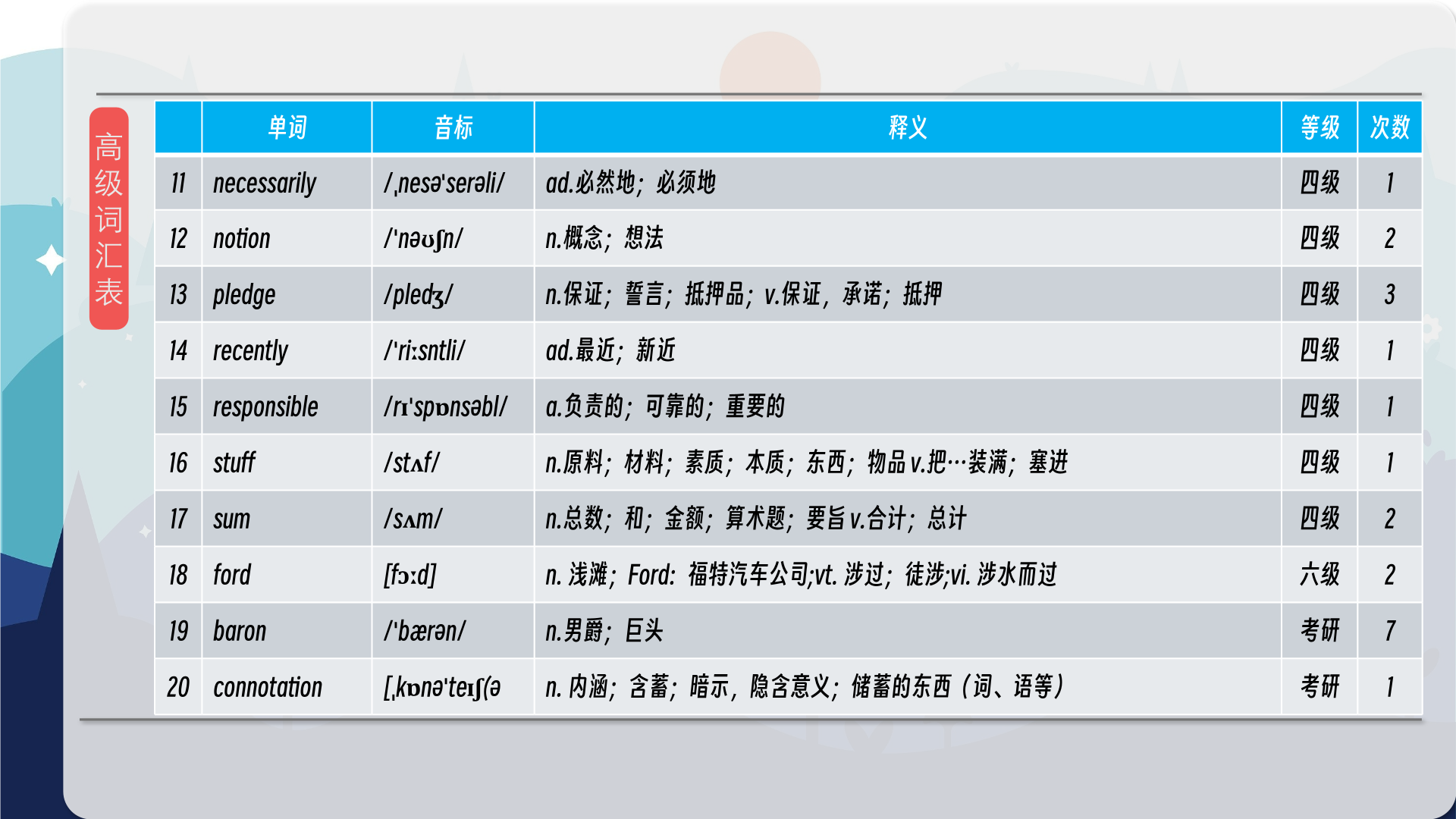
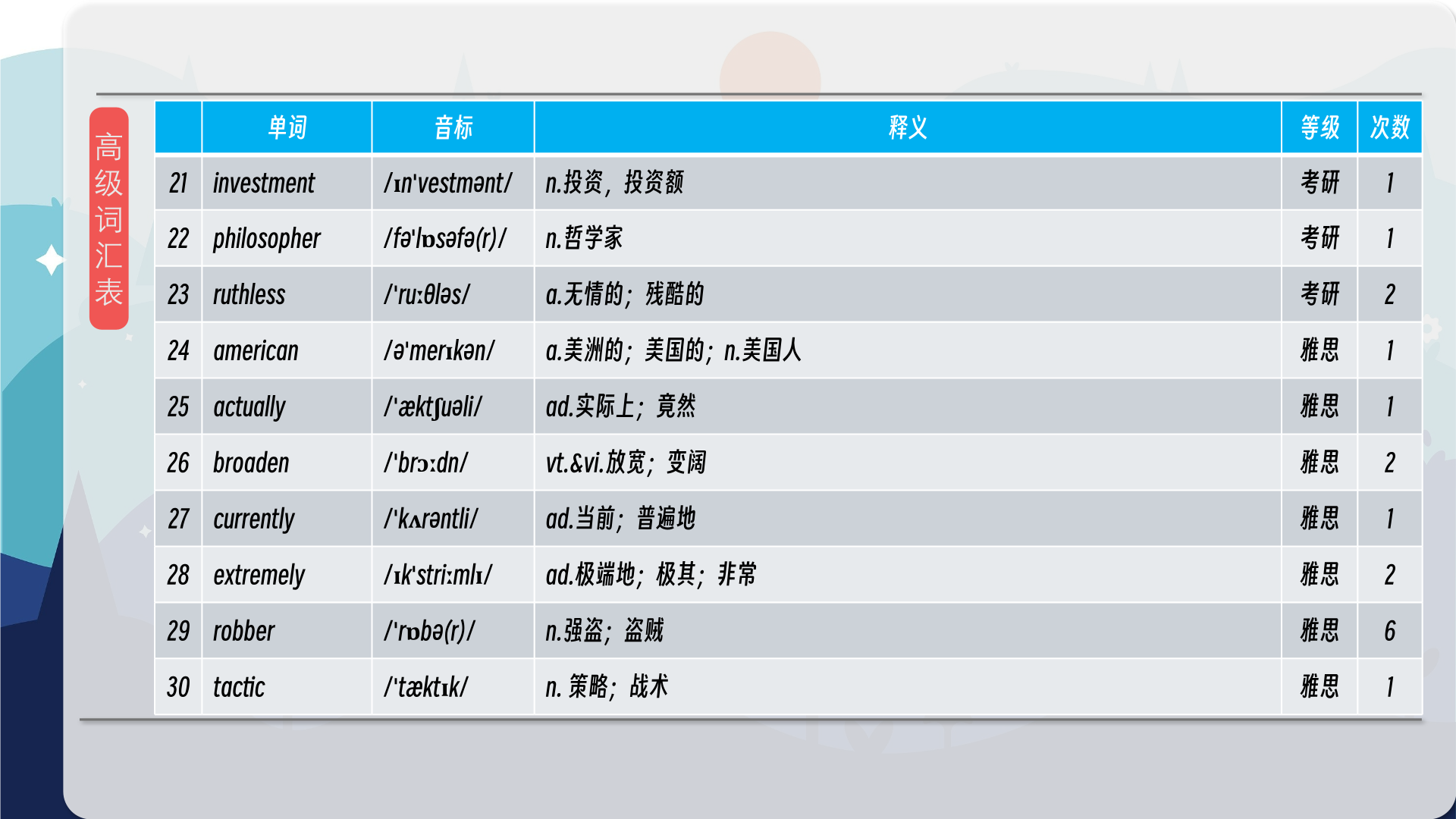
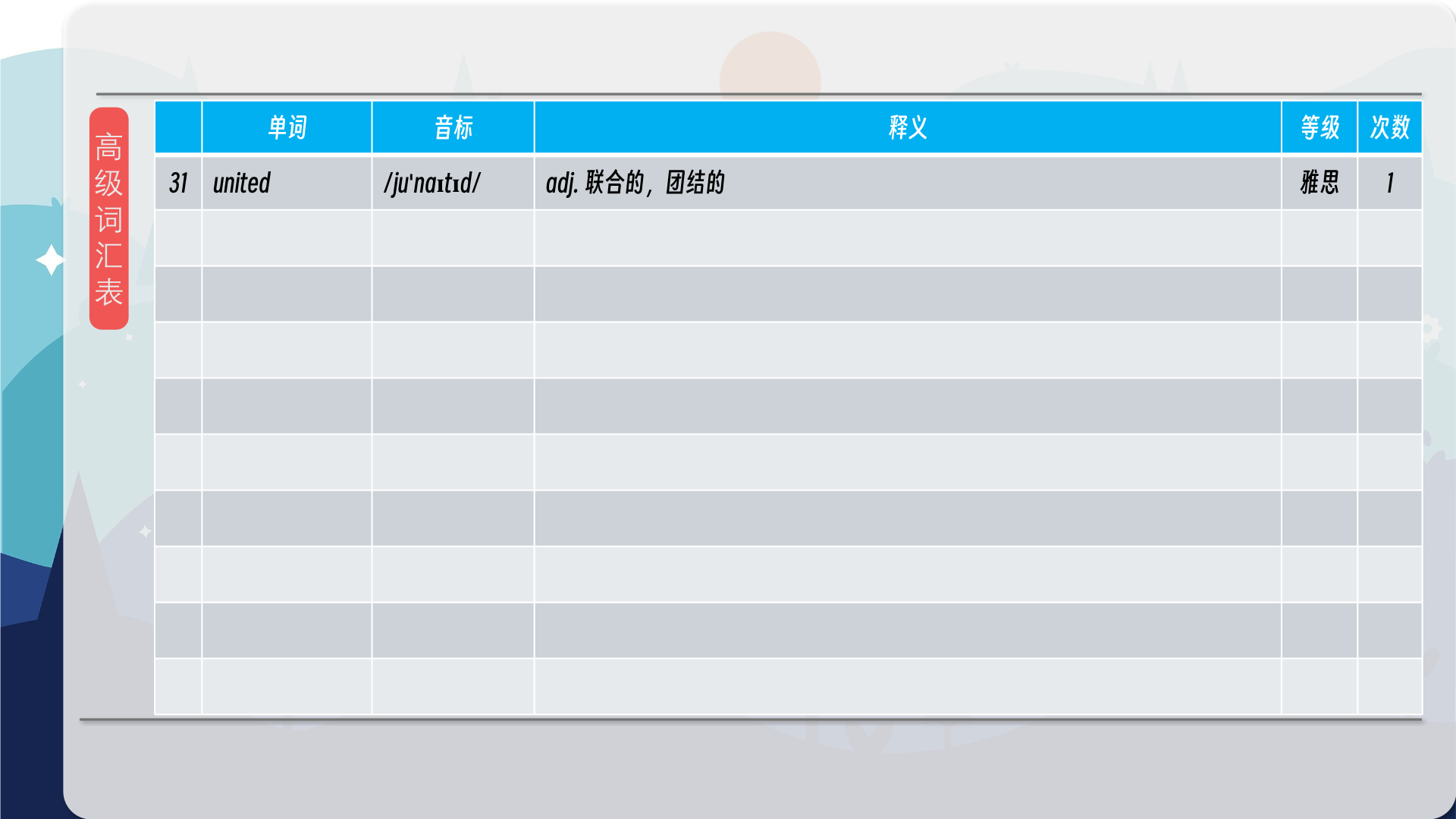

【核心词汇】
pledged
made a serious promise
承诺
做出了郑重的承诺
The government has pledged millions of pounds for disaster relief.
政府承诺提供数百万英镑用于救灾。
philanthropy
helping others, especially by giving large amounts of money to good causes
慈善
帮助他人,尤指通过捐赠大量金钱给有益的事业
His act of philanthropy made him a national hero.
他的慈善行为使他成为民族英雄。
well off
wealthy
富裕
富有的
They’re not exactly rich, but they’re fairly well off.
他们算不上富有,但也相当富裕。
human potential
people’s ability to develop or achieve things
人的潜力
人们发展或实现事情的能力
This course helps students to realize their full human potential.
这门课程帮助学生充分发挥人的潜力。
equality
(in this context) a situation where all children are equal with the same rights and opportunities as each other
平等
(在此语境下)所有儿童享有相同的权利和机会的境况
The campaign promotes equality and respect for all individuals.
这场运动提倡平等和尊重所有人。
unethical
morally wrong
不道德的
在道德上是错误的
It would be unethical for doctors to advertise treatments directly to the public.
医生直接向公众宣传治疗方法是不道德的。
在公众号里输入6位数字,获取【对话音频、英文文本、中文翻译、核心词汇和高级词汇表】电子档,6位数字【暗号】在文章的最后一张图片,如【220728】,表示22年7月28日这一期。公众号没有的文章说明还没有制作相关资料。年度合集在B站【六分钟英语】工房获取,每年共计300+文档,感谢支持!